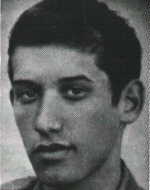Son of Yehezkel and Pesia. Born on 26.12.1949 in Kiryat Tivon, he was a lively and joyful child and attended the “Rimonim” elementary school and the humanistic trend at the Grinberg High School, both in Kiryat Tivon. Employee “from his youth until his enlistment in the IDF. He was especially fond of collecting various objects, such as insignia, insignia, and insignia of brigades, empty cartridges of rifle bullets and tank cannons of those days, and indeed he had a rare collection. He also devoted time to collecting stamps and scoring. He also loved music and his record collection contained many modern songs, which he would listen to. He was also a photographer and his camera accompanied him in all his ways, in the movement, in the tours and on the many walks. Hundreds of photographs and slides of all periods were found in his estate, arranged in albums and slides of slides. From the age of nine, he began to read the weekly Bamahane, Nachal Camp, Gadna Camp, and the like. He also read books on very serious subjects. He loved the knowledge of the land and was one of the few among his friends in the movement who did not miss a trip or a tour organized by the movement or by his friends. Therefore, every wadi and male remembered every path and path he had traveled through his many travels. He would join his father in most of the military events in which family members could be involved (such as military parades, wingshooting, graduation of officer courses, demonstrations, etc.), and was well acquainted with all that involved. His teacher at the school testified that Yair had not studied in an acceptable manner before the test and for the grade, and he was satisfied with passing the test without a very high grade, but his interest in learning was genuine. He read a lot and understood the historical-human ties between the nations and the various personalities. It seems that the silence and the time spent at home in intensive reading created for him an autonomous country and an area of his own. He also took an interest in the political and party aspects of the state. At a rather young age, he had already set his opinions and participated in arguments, which were part of family meals. Due to his interest in everything in Israel in the social, economic and political fields, and due to his extensive reading of these subjects, he was well versed in knowledge and knowledge. By nature he was quiet and his words were always said with serenity, he was not stubborn and could be persuaded by reason. It was pleasant to be with him and his friends loved him, for we did not harbor hostility toward anyone, and he did not keep anger or irritation. Yair was a perfectly neat boy. His notes and diaries from his school days were kept in chronological order and subject. He was kind and loved to help his friends and parents and always helped with small repairs at home. A few months before his enlistment, he left the nucleus of which he was a member and with his friends went to all the camps, to work days in the farms and to be absorbed. “I grew up with you in Tivon, and I miss you,” he explained in a conversation with friends, “and if I leave you for the army, I will continue to be in the same hothouse in the army. But I want to know Israel, the second Israel. That’s why I decided to leave the core. “Yair was drafted into the IDF in August 1968 and took flight tests, but because of a flaw in his eye, he was disqualified. He was assigned to the paratroopers and there was no limit to his approval. But once in a run his leg muscle was torn, and he had to stop training and wait for the next paratroopers’ recruits. But he did not want to wait, he wanted to return to the kibbutz and there he volunteered for the Golani Brigade. There (as he said later), he found no physical limitations and without any difficulties, he practiced with all the soldiers. Thus he served for two years without complaining or talking about fatigue and physical exertion. On the contrary, since his enlistment, his body has weakened and he has been vaccinated. He wanted to become a status not because of his father, but ratherby himself. He did not want them to know in the army that he was the son of a senior officer and did not want to stand out and boast about it. He loved his family and his house very much. While his father was ill and hospitalized for several weeks to visit him, his visits were a source of encouragement and joy, while at the same time supporting his mother and helping her. On September 30, 1970, he fell in an operational operation on the Lebanese border and was brought to eternal rest in the military cemetery in Haifa, after which the parents issued a book bearing the name “Yair” In 1970-1971, two scholarships were awarded to two students without means, and a corner was set in the lecture hall of the Grinberg High School in memory of three school graduates who fell in the Six Day War and afterwards, and one of them will be illuminated.
